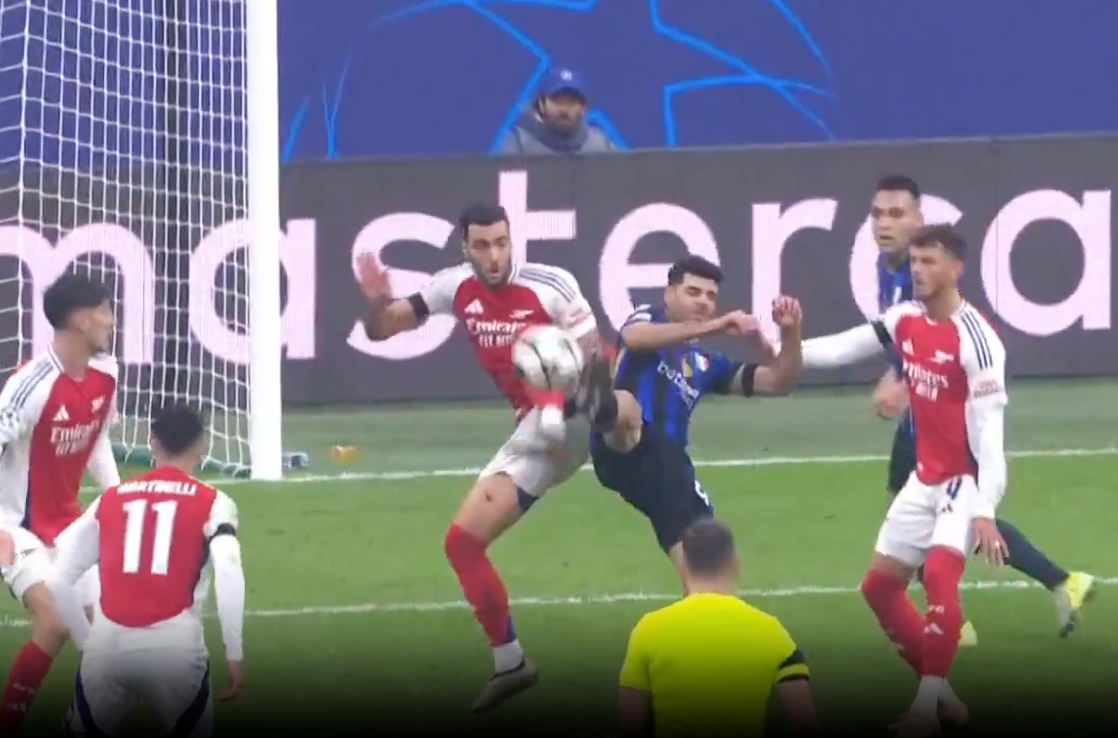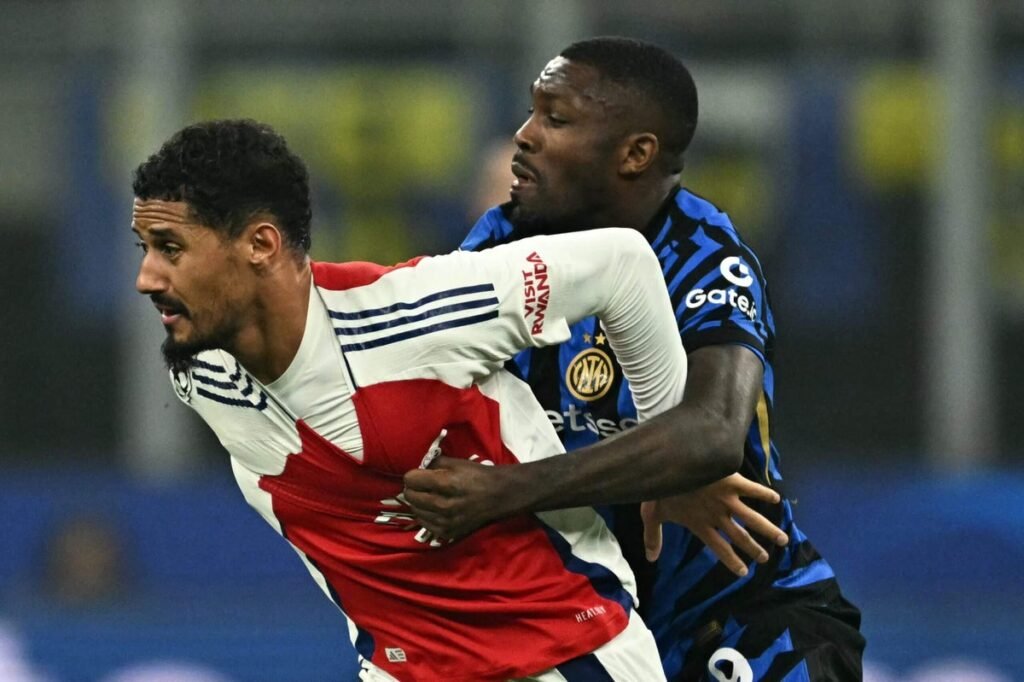It was a frustrating night for Arsenal at San Siro as a well-drilled Inter Milan side claimed a 1-0 victory.
Mikel Arteta’s side had not conceded in the competition in the previous three rounds, but were undone by a first-half penalty and struggled to create chances from open play themselves as they fell to defeat in Italy.
Denzel Dumfries hit the bar early on for Inter before a penalty for handball against Mikel Merino just before half-time allowed Hakan Calhanoglu to convert. Merino could do little about the incident and it drew comparison to a penalty awarded to Manchester City in their defeat to Sporting on Tuesday.
Despite the defeat, it is questionable in the new Champions League format how damaging this result will be for Arsenal. While the return in the final minutes of Martin Odegaard was a huge positive for Arteta.
James McNicholas, Jordan Campbell, James Horncastle and Mark Carey break down the action.
How much does defeat really matter for Arsenal?
A Champions League fixture against Inter Milan at San Siro is the sort of glamour tie most clubs can only dream of. And yet this game suffered from a distinct lack of stakes. The unfortunate truth is that, under the new format, this was a game both teams could probably afford to lose.
There are positives to this new-look Champions League: there is more variety in fixtures, more volatility to table positions. A club can lose their first few games and still recover sufficiently to make it through to the next round.
For the biggest clubs, however, there is also a palpable lack of jeopardy.
As things stand Arsenal sit 12th out of 36 places in the Champions League table. Despite this defeat, it would still take a remarkable collapse for them to fail to qualify for the next stage.
Arsenal would like to finish in the top eight and avoid an extra knockout round — but it’s a convenience, not a necessity.
James McNicholas
Set-piece chances can’t replace open-play creation
At what point does Arsenal’s threat from set pieces stop becoming a bonus, and start becoming a crutch?
Arsenal had 13 corners in this match, to Inter’s none. They produced considerable danger from them too. Bukayo Saka’s delivery remains very consistent, and in the likes of Merino, Kai Havertz and Gabriel Arsenal have players who provide a real threat. Ultimately, however, it was not enough to help them find an equaliser.
Corners are clearly a focus for Arsenal: in the pre-match warm-up, Saka wandered over to the side of the pitch to practise swinging one in.
But of late it feels like Arsenal are struggling to recreate the same kind of threat in open play. Arteta must be hoping the return of Martin Odegaard, who came on towards the end after his return from injury, can ease their creative issues.
James McNicholas
How Inter constrained Saka
Any game plan that an opponent has must account for the 23-year-old’s skill set, and the most common method has been to double-mark him to ensure he does not have the space to punish them. In the past 18 months, the rotations between Saka, Ben White and Martin Odegaard have meant that Arsenal’s fluid right flank has been hard to stop — even when you know what is coming.
However, with Odegaard out of the team, it has become easier to keep Saka quiet. Newcastle did it well last weekend, with Joelinton doubling up to support left-back Lewis Hall at St James’ Park, and it was the same at San Siro — with Matteo Darmian staying touch-tight to Saka with support from left centre-back Yann Bisseck or a covering midfielder, either Davide Frattesi or later Henrikh Mkhitaryan.
Arsenal tried to think of ways to free Saka up when progressing up the field. At times, Leandro Trossard would pull to the right flank to offer as a passing option which allowed Saka to stay higher up the field to receive the ball.
Mikel Arteta’s men persisted with their attack down the right side, with 44 per cent of their attacking touches coming down the right third of the pitch. However, Inter were dogged and disciplined in ensuring that Arsenal’s star man was not able to have the attacking output that he would normally wish to have.
Mark Carey
Champions League penalties
If Arsenal felt like luck had deserted them going into their trip to Milan, Inter’s penalty seconds before half-time did not help in changing that sentiment.
A free-kick delivery was hooked on by Mehdi Taremi, which saw the ball ricochet off Mikel Merino’s hand. He was less than a yard away so had no time to react but, as his arm was slightly away from his body, VAR ruled that it was a handball offence.
It was harsh to penalise Merino but it is like with the Champions League’s much lower bar for handball compared to the Premier League.

A similar incident happened on Tuesday when Sporting’s Ousmane Diomande blocked a shot with his foot, which cannoned upwards off his arm.
Despite there being no deliberate intent, Manchester City were awarded a penalty based on their interpretation of the IFAB rule which states that a handball is when a player “touches the ball with his hand or arm, when the hand or arm is positioned in an unnatural way and causes the body to take up more space”.
Arsenal appealed for a penalty of their own earlier in the first half when Merino made late run into the box and got on the end of Gabriel Martinelli’s inswinging cross.
Yann Sommer attempted to punch the ball away and, although it was unclear how much of the ball the Swiss goalkeeper’s glove connected with, his follow-through caught Merino on the face.
The shot went over the bar and VAR did not spent much time looking at the incident, presumably because Sommer was deemed not to have sufficiently impeded the action of heading the ball.
For Merino, both incidents preceded a half-time substitution. It summed up what has been a testing start to life at Arsenal after a shoulder injury days after his transfer from Real Sociedad kept him out for a month.
Jordan Campbell
Inzaghi’s changes mark of a great coach
It’s a measure of how confident Inter and Simone Inzaghi have become in Europe that he feels he can rotate so heavily for big Champions League games. Before his arrival, Inter had gone nine years without getting out of the group stages. Their prolonged absence from the competition meant their co-efficient suffered and they were drawn in tough groups.
Inzaghi’s predecessors Luciano Spalletti and Antonio Conte would argue in mitigation that they were building from the ground up rather than standing on the roof of the skyscraper Inter have since erected. Nevertheless it is telling that they no longer feel obliged to put out their strongest paper XI to get results like tonight’s against Premier League opposition.
Inzaghi started aggressively rotating in the group stages last year and has continued in the same vein this time around. New signings like Piotr Zielinski and, in particular, Mehdi Taremi can’t complain about a lack of playing time in Serie A when they’ve both started prestige games against Manchester City and Arsenal.
Tonight, Inzaghi pushed the envelope further. The Italian core of his team — Alessandro Bastoni, Federico Dimarco and Nicolo Barella — began the game on the bench. Wrapped up warm next to them was Henrikh Mkhitaryan and Marcus Thuram, who, though disappointing at the weekend, has had an excellent start to the season. And guess what? You didn’t notice much, if at all. That’s the mark of a great coach
James Horncastle
What did Mikel Arteta say?
We will bring you this after he has spoken at the post-match press conference.
What next for Arsenal?
Sunday, November 10: Chelsea (A), Premier League, 4.30pm GMT, 11.30am ET
Recommended reading
(Top photo: GABRIEL BOUYS/AFP via Getty Images)
Read the full article here

